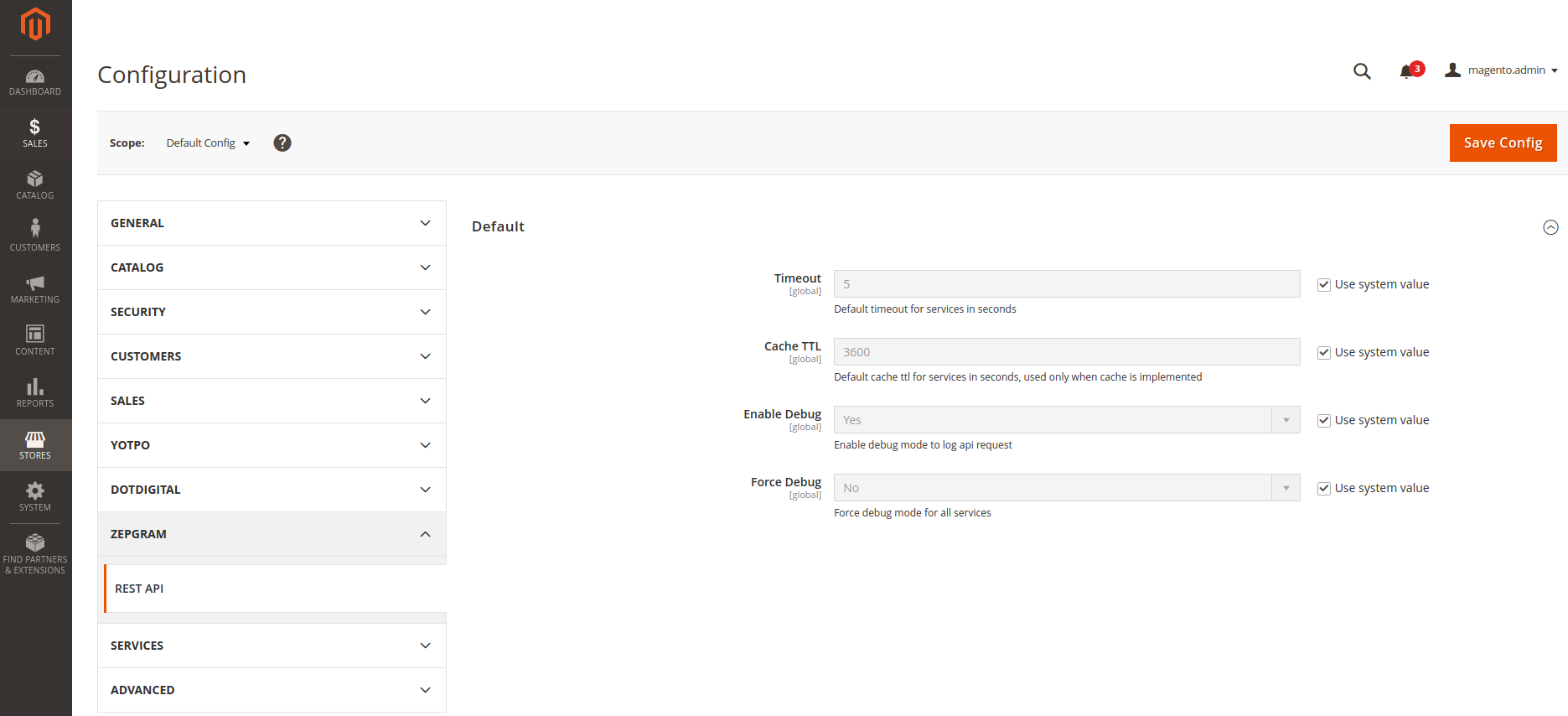Zepgram Rest
Technical module to industrialize API REST call with dependency injection using Guzzle library. Provides multiple features to make your life easier while implementing a REST service as Magento developer:
- Prevent code duplication with a basic implementation in di.xml (only 1 class to create)
- Centralize all your REST web service under the same configuration or set a custom one
- Benefits built-in registry and cache system to ensure and secure performance
- Include a generic logger who provides all data with a debug mode option to retrieve parameters, request and result
- Declare your request and result as a json serialized or not, avoiding multiple implementation of the serializer
Installation
composer require zepgram/module-rest
bin/magento module:enable Zepgram_Rest
bin/magento setup:upgrade
Guideline
-
Create a Request Adapter class for your service extending abstract class
Zepgram\Rest\Model\RequestAdapter, this class represent your service contract adapter:- public const SERVICE_ENDPOINT: define the service endpoint
- dispatch(DataObject $data): initialize Magento data that you must adapt to request the web service
- getBody(): implement body request
- getHeaders(): implement headers
- getUri(): implement uri endpoint (used to handle dynamic values)
- getCacheKey(): implement cache key for your specific request (you must define a unique key)
-
Create a Virtual Class from
Zepgram\Rest\Service\ApiRequestand customize its injections for your needs by following the below configuration:Variable name Type Default value Is Optional Description serviceName string default no Value to retrieve group id from system config requestAdapter object RequestAdapter no Adapter class to build and customize the request validator object null yes Validate the service contract method string GET yes Request method isJsonRequest boolean true yes Parse request array to json isJsonResponse boolean true yes Parse response string to array isVerify boolean true yes Enable SSL certificate verification -
Create a system.xml, and a config.xml that must use the serviceName injected previously:
- section:
rest_api - group_id:
$serviceName - fields:
base_uritimeoutis_debugcache_ttl
- section:
-
Go to the class who will run the web service and inject the
Zepgram\Rest\Service\ApiFactoryin his constructor. -
Create ApiRequest with the ApiFactory
$this->apiFactory->create('VirtualClassName', $data)where:- VirtualClassName represents the Virtual Class declared previously in di.xml
- $data represents the dynamic data that you will receive in
dispatch()method
-
Finally, the factory will return your dedicated
ApiRequestto send the request use the method:$apiRequest->send().
Configuration
 If you do not declare specific configuration, the request will fall back on default configuration. To override the default config, you must follow this system config pattern:
If you do not declare specific configuration, the request will fall back on default configuration. To override the default config, you must follow this system config pattern: rest_api/%service_name%/base_uri
Example
Here is a simple implementation example with a service called Foxtrot using the order object:
FoxtrotOrderRequestAdapter.php
<?php
declare(strict_types=1);
namespace Zepgram\Sales\Rest;
use Magento\Framework\DataObject;
use Magento\Sales\Api\Data\OrderInterface;
use Zepgram\Rest\Model\RequestAdapter;
class FoxtrotOrderRequestAdapter extends RequestAdapter
{
/** @var string */
public const SERVICE_ENDPOINT = 'v1/order/';
/** @var OrderInterface */
private $order;
/**
* {@inheritDoc}
*/
public function dispatch(DataObject $data): void
{
$this->order = $data->getOrder();
}
/**
* {@inheritDoc}
*/
public function getBody(): array
{
return [
'orderId' => $this->order->getEntityId(),
'customer' => $this->order->getCustomerEmail(),
'orderTotal' => $this->order->getGrandTotal(),
'version' => '1.0',
];
}
/**
* {@inheritDoc}
*/
public function getHeaders(): array
{
return [
self::HEADER_ACCEPT => self::CONTENT_JSON,
self::HEADER_CONTENT_TYPE => self::CONTENT_JSON,
];
}
/**
* {@inheritDoc}
*/
public function getUri(): ?string
{
return self::SERVICE_ENDPOINT;
}
/**
* {@inheritDoc}
*/
public function getCacheKey(): ?string
{
return null;
}
}
di.xml
<?xml version="1.0"?>
<config xmlns:xsi="http://www.w3.org/2001/XMLSchema-instance"
xsi:noNamespaceSchemaLocation="urn:magento:framework:ObjectManager/etc/config.xsd">
<!-- rest api -->
<virtualType name="FoxtrotOrderApiRequest" type="Zepgram\Rest\Service\ApiRequest">
<arguments>
<argument name="serviceName" xsi:type="string">foxtrot</argument>
<argument name="requestAdapter" xsi:type="object">Zepgram\Sales\Rest\FoxtrotOrderRequestAdapter</argument>
<argument name="method" xsi:type="const">Laminas\Http\Request::METHOD_POST</argument>
<argument name="isVerify" xsi:type="boolean">false</argument>
</arguments>
</virtualType>
</config>
system.xml
<?xml version="1.0"?>
<config xmlns:xsi="http://www.w3.org/2001/XMLSchema-instance"
xsi:noNamespaceSchemaLocation="urn:magento:module:Magento_Config:etc/system_file.xsd">
<system>
<section id="rest_api">
<group id="foxtrot" translate="label" type="text" sortOrder="10" showInDefault="1" showInWebsite="0"
showInStore="0">
<label>Foxtrot</label>
<field id="base_uri" translate="label" type="text" sortOrder="1" showInDefault="1" showInWebsite="0"
showInStore="0" canRestore="1">
<label>Base URI</label>
</field>
<field id="timeout" translate="label" type="text" sortOrder="1" showInDefault="1" showInWebsite="0"
showInStore="0" canRestore="1">
<label>Timeout</label>
</field>
<field id="cache_ttl" translate="label" type="text" sortOrder="5" showInDefault="1" showInWebsite="0"
showInStore="0" canRestore="1">
<label>Cache TTL</label>
</field>
<field id="is_debug" translate="label" type="select" sortOrder="10" showInDefault="1" showInWebsite="0"
showInStore="0" canRestore="1">
<label>Enable Debug</label>
<source_model>Magento\Config\Model\Config\Source\Yesno</source_model>
</field>
</group>
</section>
</system>
</config>
config.xml
<?xml version="1.0"?>
<config xmlns:xsi="http://www.w3.org/2001/XMLSchema-instance" xsi:noNamespaceSchemaLocation="urn:magento:module:Magento_Store:etc/config.xsd">
<default>
<rest_api>
<foxtrot>
<base_uri>https://foxtrot.service.io</base_uri>
<timeout>30</timeout>
<cache_ttl>7200</cache_ttl>
<is_debug>1</is_debug>
</foxtrot>
</rest_api>
</default>
</config>
OrderDataExample.php
<?php
declare(strict_types=1);
namespace Zepgram\Sales\Model;
use Zepgram\Rest\Exception\InternalException;
use Zepgram\Rest\Exception\ExternalException;
use Zepgram\Rest\Service\ApiFactory;
use Zepgram\Sales\Api\OrderRepositoryInterface;
class OrderDataExample
{
/** @var OrderRepositoryInterface */
private $orderRepository;
/** @var ApiFactory */
private $apiFactory;
public function __construct(
OrderRepositoryInterface $orderRepository,
ApiFactory $apiFactory
) {
$this->orderRepository = $orderRepository;
$this->apiFactory = $apiFactory;
}
/**
* @param int $orderId
* @throws MyAweSomeTechnicalException
* @throws MyAwesomeBusinessException
*/
public function execute(int $orderId): void
{
try {
$order = $this->orderRepository->get($orderId);
// prepare request
$foxtrotApiRequest = $this->apiFactory->create('FoxtrotOrderApiRequest', ['order' => $order]);
// send request
$result = $foxtrotApiRequest->send();
// handle result
$order->setData('foxtrot_order_result', $result);
$this->orderRepository->save($order);
} catch (ExternalException $e) {
$context['context_error'] = 'We could not reach foxtrot order service'
// service is unavailable due to technical reason: do something (log, throw, errorMessage..)
$this->logger->error($e, $context);
throw MyAwesomeTechnicalException(__('Foxtrot server error'), $e);
} catch (InternalException $e) {
$context['context_error'] = 'Magento request is wrong, foxtrot order service could not handle it'
// service rejected request for business reason: do something (log, throw, errorMessage..)
throw MyAwesomeBusinessException(__('Bad request error'), $e);
}
}
}
Exceptions Bad-Practices
Please do not catch something for nothing when you use this module. For example, if you are doing this:
try {
return $apiRequest->send();
} catch (InternalException $e) {
throw new InternalException(__('Internal error'));
} catch (ExternalException $e) {
throw new ExternalException(__('External error'));
} catch (Throwable $e) {
throw $e;
}
It has no value for the code and for the business because you are throwing the same exception and hiding the real error. Try/catch MUST only be used when you are able to handle errors for your feature (detailed logs, retry etc...).
Also, the Throwable catch here will never throw.
The module only return Internal and External exception.
Others exceptions thrown are technical exception, they are returned when you do not implement the module correctly.
To handle ALL exceptions thrown by this module you can catch Zepgram\Rest\Exception\RestException
Issues
If you encountered an issue during installation or with usage, please report it on this github repository.

